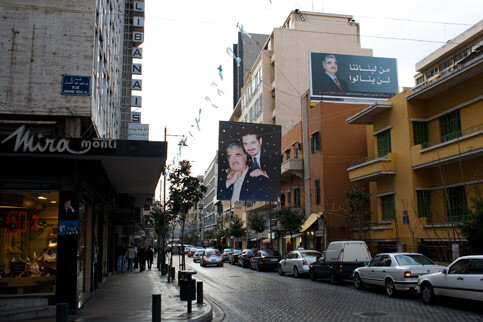Electronic Lebanon 12 February 2008

A poster showing Sa’ad Hariri with his father Rafik Hariri hangs above the street in one of Beirut’s pro-March 14 neighborhoods. (Matthew Cassel)
“We don’t want a confrontation. But if we are dragged into one, we will not stay [with our] hands tied,” warned Parliamentary Majority Leader Sa’ad Hariri during a speech to supporters and journalists in Tripoli on Saturday night. His words to Hizballah and the Lebanese opposition echoed those of top US diplomat to the Middle East David Welch in a letter to Arab League chief Amr Mousa in which he warned that the US would not sit by with its “hands tied” if the current political crises continues.
The US, along with its close ally and Lebanon’s hostile neighbor, Israel, have long wanted to see the disarmament of the resistance and now political movement Hizballah. This is especially so after Israel’s withdrawal from southern Lebanon in 2000 and Israel’s failure to militarily defeat the group during the July 2006 war, both widely viewed as Hizballah victories.
Hariri, the son of assassinated former Prime Minister Rafiq Hariri, and others in the ruling March 14 coalition, who say Syria and its allies are responsible for the string of bombings and assassinations that have killed more than 100 people in Lebanon over the last three years, have tried to fight off accusations that they are acting on behalf of the US and Israel. However it didn’t help their case when, a day after Hariri’s speech, Druze leader allied with the March 14 coalition Walid Jumblatt spoke to his supporters using nearly identical rhetoric as the US and Hariri, saying that March 14 would not sit with their “arms folded” waiting for conflict in Lebanon to occur.
The “hands tied” and “arms folded” statements suggest coordination between the US and March 14 and their new unified and more aggressive stance towards Hizballah. These statements also indicate that the playing field for Lebanese politics is changing, and fast. The country has been without a president since Emile Lahoud’s extended term ended in November 2007, and since then both sides have in principle agreed to a candidate, though they have not agreed on the composition of the government, where the big issue, should Hizballah be included, is whether they will be able to protect their right to bear arms as a resistance movement against any future Israeli aggression in Lebanon.
The US and Israel perceive their interests in eliminating and disarming the Shia political party, formed as a resistance movement in the early 1980s soon after the beginning of the 22-year-long Israeli occupation. This was Israel’s motivation behind the 2006 war when it tried to defeat Hizballah and cause them to lose popular support but failed to do so. Now, if armed conflict does arise March 14 can also be sure that it will receive US military support like it did during the summer of 2007, when the Lebanese army received US weaponry to help them conduct their battle against extremists in the Nahr al-Bared refugee camp.
During the Lebanese civil war, Israel used right-wing groups in Lebanon like the Phalangists and the South Lebanese Army to help it fight against the Palestinian and other resistance factions. This strategy worked well for Israel as it played the groups against each other to protract the bloody war. Eventually, with the Palestinians and their Lebanese allies weakened by the infighting, Israel occupied Lebanon as far north as Beirut and forced the Palestinian Liberation Organization to move its headquarters out of Lebanon.
Now, 30 years later, it seems this same tactic is being employed with the US and Israel pushing again for an internal conflict in Lebanon, this time to neutralize Hizballah.
The fact that US President George W. Bush is nearing the end of his second and final term in office could explain the hastening of this goal. Since the war in Iraq began in 2003 the neocons in the Bush administration have been anxious to go to war with Iran. Over that time top Israeli officials have also encouraged the US to take military action against the Islamic Republic. A conflict in Lebanon, they hope, would weaken Iran’s close ally Hizballah, and could even spill over and open the path for a military strike against Iran. What’s more, Israel was emboldened by the international community’s tacit consent towards its strike on Syria last summer, as demonstrated by the lack of outcry over this blatant violation of Syria’s sovereignty.
The US and Israel — the two states committing the only military occupations in the region — are having an adverse influence on Lebanese internal affairs. But the people wait, unsure of what the future holds for Lebanon. The question for many is no longer if, but when will the situation quickly deteriorate into an armed internal conflict reminiscent of Lebanon’s recent history.
According to Hariri and Jumblatt, they are “ready” for such a scenario to occur. However the Lebanese people’s silently majority, still deeply scarred from the 15-year civil war, believe something else.
Matthew Cassel is an independent journalist and photographer based in the Middle East.





